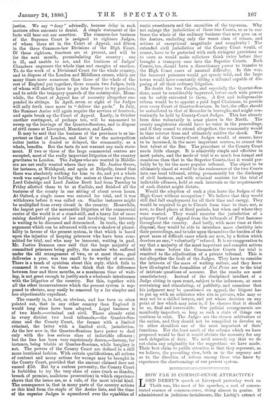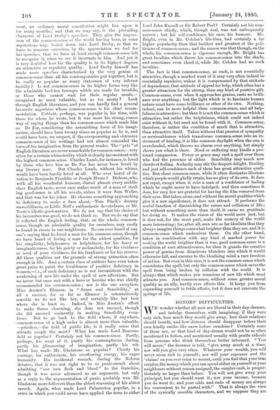HOW FAR IS COMMON-SENSE ATTRACTIVE ?
LORD DERBY'S speech at Liverpool yesterday week on Thrift was, like most of his speeches, a sort of concen- trated essence of common-sense, rising almost to genius. If administered in judicious instalments, like Liebig's extract of
meat, an ordinary moral constitution might live upon it for many months; and that, we may say, is the prevailing character of Lord Derby's speeches. They give the impres- sion of the common-sense of the world having been, in some mysterious way, boiled down into Lord Derby, so that we have to reassure ourselves, by the appreciation we feel for his speeches, that we have at least enough common-sense left to recognise it, when we see it incarnate in him. And yet it is very doubtful how far the quality is in its highest degrees an attractive or repulsive quality. Lord Derby himself has made more speeches characterised by the very genius of common-sense than all his contemporaries put together, but is he really as popular as many statesmen of very inferior lucidity ? Is not common-sense in its higher forms very like the admirable beef-tea lozenges which are made for invalids, or those who cannot wait for their regular meals,— recognised as most valuable, but as too meaty ? Look through English literature, and you can hardly find a general favourite anywhere whose common-sense is his chief recom- mendation. Cobbett, perhaps, was popular in his time, with those for whom he wrote, but it was more his strong, coarse way of saying things than his common-sense which made him so. De Foe, considering the astonishing force of his imagi- nation, should have been twenty times as popular as he is, and would have been, we suspect, if the overpowering and obtrusive common-sense of his writings had not almost concealed the force of his imagination from the general reader. The " pets " of English literature are never remarkable for common-sense,—very often for a certain whimsicality which is clearly inconsistent with the highest common-sense. Charles Lamb, for instance, is loved by those who love him as De Foe has never been loved by any literary man. But Charles Lamb, without his whims, would have been hardly loved at all. Who ever heard of de- votion to Benjamin Franklin or Joseph Hume ? Dickens, who, with all his wonderful humour, shared almost every middle- class English taste, never once makes much of a man of sterl- ing good-sense in all his novels, unless it were Sam Weller, and that was for his jokes. He chooses something approaching to deficiency to make a fuss about,—Tom Pinch's dreamy unworldliness, or Little Nell's enthusiastic devotedness, or Mr. Toots's idiotic good-nature. We do not say that his choice of his favourites was good, we do not think so. But we do say that it reflected the English feeling, that, on the whole, common- sense, though an admirable quality for ourselves, may easily be found in excess in our neighbours. No one ever heard of any one's saying that be loved a man for his common-sense, though
.we have heard of loving a man for the oddest qualities, for his simplicity, helplessness or helpfulness, for his fancy or imaginativeness, for his gaiety or melancholy, for his vividness or need of your vividness, for his frankness or for his reserve. All these qualities are the grounds of strong attraction often enough in life. And a certain class of authors have even taken great pains to paint the lovableness of positive deficiency in women,—i.e., of such deficiency as is not inconsistent with the awakening of new life under the spell of new affections. But we never but once met with a hero or heroine who was chiefly recommended for common-sense; nor is the one exception, Miss Austen's Eleanor, in " Sense and Sensibility," at all a success, for so far as Eleanor is ostentatiously sensible we do not like her, and certainly like her best where she is least so. Indeed, in Miss Austen's effort to make Sense charming, she does not succeed, though she did succeed eminently in making Sensibility vexa- tious. But to go back to the field where, if anywhere,
- common-sense of a high order is almost more than valuable, —priceless,—the field of public life, is it really sense that attracts people the most? What has made Lord Beacons- field so popular? Certainly not his common-sense. Partly, perhaps, his want of it, partly his contemptuous daring, partly his glimmering of imagination, partly his wit. What has made Mr. Gladstone so popular? Chiefly his courage, his enthusiasm, his overflowing energy, his eager humanity. His incidental remark, during the Reform debates, that it was not right to be so panic-struck about admitting " our own flesh and blood " to the franchise, though it was never advanced as an argument, but only as a reply to the argumentation of panic, probably won Mr. Gladstone more followers than the ablest reasoning of his ablest speech. Again, what made Lord Palmerston popular, in a sense in which you could never have applied the term to either Lord John Russell or Sir Robert Peel? Certainly not his com- mon-sense chiefly, which, though real, was not unfrequently narrow ; but his self-confidence, his ease, his humour. Mr. Bright, even in Mr. Cobden's life-time, had certainly a far higher popularity than that lucidest and greatest of the poli- ticians of common-sense ; and the reason was that though, on the whole, his common-sense is vigorous enough, Mr. Bright has great faculties which throw his common-sense into the shade, and sometimes even cloud it, while Mr. Cobden had no such faculties.
The fact is that common-sense, as such, is not essentially attractive, though a marked want of it may very often indeed be essentially repulsive, unless it is compensated by that attitude of dependence, that attitude of appeal for help, which often has a greater attraction for the strong, than any kind of positive gift. Common-sense, even when it approaches genius, casts no brilli- ance over anything; but the light which is to fascinate human nature must have some brilliance or other of its own. Nothing, indeed, can be more helpful than common-sense, and all help- fulness is attractive ; but then it is not the common-sense which is attractive, but rather the helpfulness, which could not indeed exist without it, but need not be found with it. Common-sense, therefore, is rather the condition of much that is attractive, than attractive itself. Taken without that passion of sympathy or serviceableness which transforms common-sense into an in- strument of healing, it is like common daylight when the sun is overclouded, which throws no charm over anything, but simply shows you what is there. Need or suffering may kindle a pro- found compassion. Power or grace may cast a spell over those who feel the presence of either. Sensibility may touch new chords of feeling. Audacity may stir the deepest delight. Docility and just self-confidence each of them has great attractive quali- ties. But sheer common-sense, while it often dissipates illusions which people would gladly retain, has no glory of its own. It does not repel, except when it robs a man of a confidence of feeling which he ought never to have indulged; and then sometimes it does, for very few are grateful for having the film removed from their eves. But taken alone, and without the moral qualities which give it a new significance, it does not attract. It performs the useful function of diminishing the errors and collisions of life ; but without something more than itself, it earns no gratitude for doing so. It makes the vision of the world more just, but it does not, for the most part, make the scenery of the world more interesting ; for, after all, men are so far idealists that they always imagine things somewhat brighter than they are, and it is common-sense which undeceives them. On the other hand, taken in combination with any kind of marked power for making the world brighter than it was, good common-sense is a condition of vast attractiveness, for then it guards the creative power of genius from disastrous blunders into which it would otherwise fall, and ensures to the idealising mind a rare freedom of action. But even in this case, it is not the common-sense which constitutes the spell, but only the common-sense which saves the spell from being broken by collision with the world. It is always that which makes you conscious of new life which most attracts you. And common-sense, without some greater moral quality as an ally, hardly ever effects this. It keeps you from expending yourself in futile efforts, but it does not renovate the springs of life.



































 Previous page
Previous page